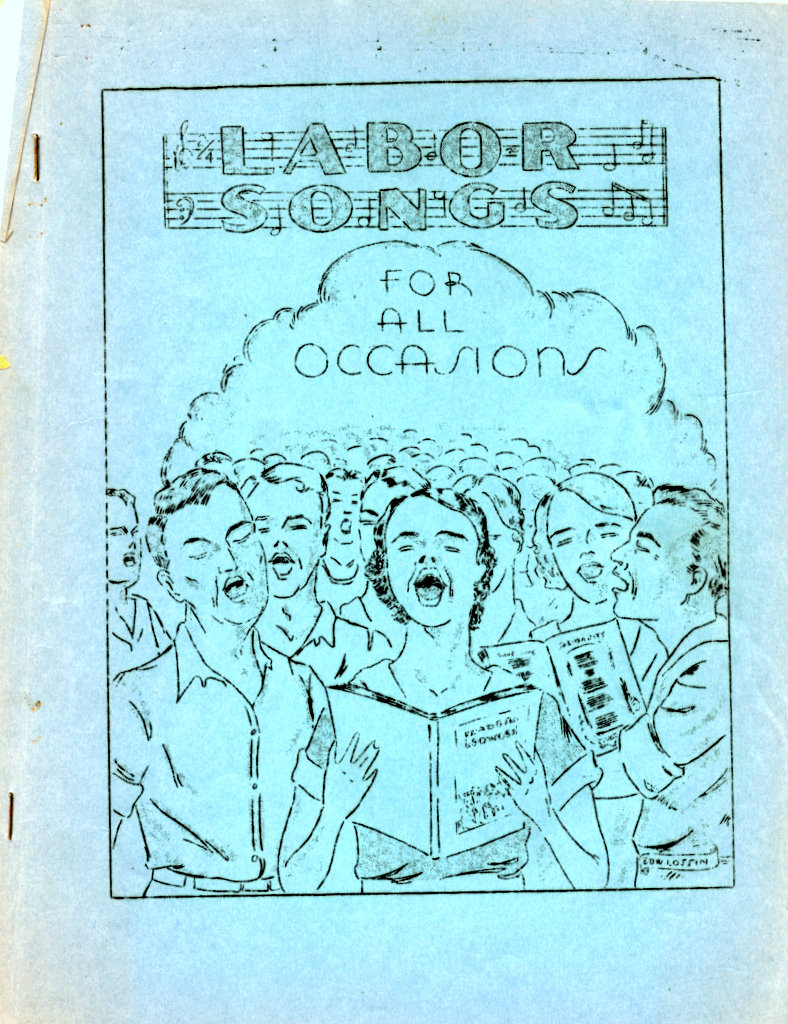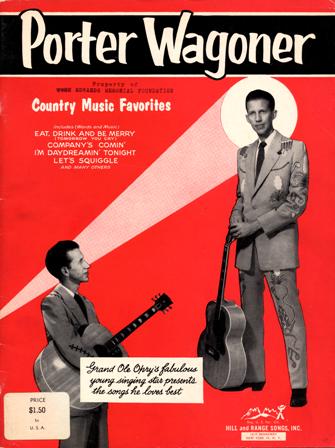 P2998, from the John Edwards Memorial Foundation Collection (#20001), is but one of a series of photographs documenting the recording sessions for Bob Wills’s final album, For the Last Time. Sessions, produced by the legendary guitarist Tommy Allsup (another former Cricket like Bobby Durham), took place just outside of Dallas on December 3 and 4, 1973.
P2998, from the John Edwards Memorial Foundation Collection (#20001), is but one of a series of photographs documenting the recording sessions for Bob Wills’s final album, For the Last Time. Sessions, produced by the legendary guitarist Tommy Allsup (another former Cricket like Bobby Durham), took place just outside of Dallas on December 3 and 4, 1973.
Haggard drove all night from Chicago to participate on the final day after begging permission from Wills to attend. Sadly, Wills was unable to complete the session after suffering a severe stroke on the night of December 3 and slipping into a coma the following day never to retain consciousness. Haggard and the band, the first reunion of the Texas Playboys since Wills disbanded the group in the 1960s, pressed on with noted successor of the Bob Wills sound Hoyle Nix stepping up into the boots of his hero to lead the group.
We are not positive, but we believe the photo above includes Haggard, fiddlers Keith Coleman and Johnny Gimble, steel guitarist Leon McCauliffe, and the back of guitarist Eldon Shamblin’s head.
Category: JEMF Collection
Photo of the Week: Bobby Durham
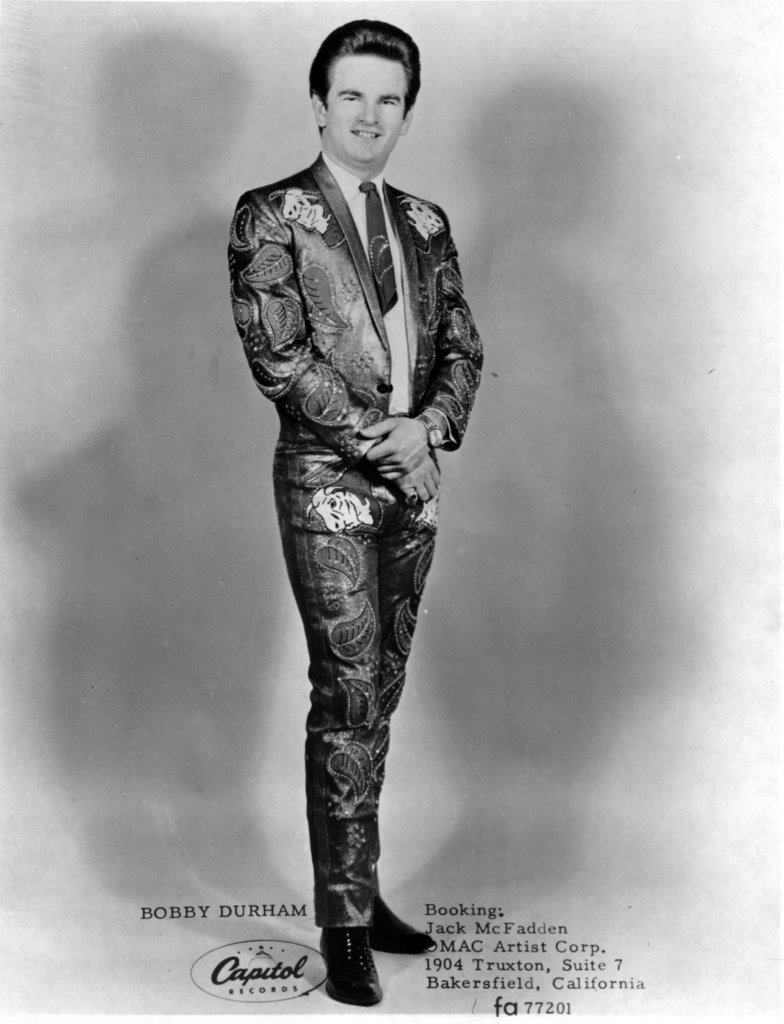 Bobby Durham was not just a smart dressed man. A prominent vocalist with the Bakersfield sound, Durham got his start in country music performing on California country music variety shows like Town Hall Party and Hometown Jamboree. After stints with Cousin Ebb Pillings’s Ozark Squirrel Shooters and Jolly Judy and her Go-Go Daddies, Durham signed with Capitol Records in the early 1960s. He scored a major hit with the Merle Haggard penned classic “My Past is Present,” earning Durham a 1965 Academy of Country Music Awards nomination for “Most Promising Male Vocalist.” Durham later joined The Crickets, performing some excellent progressive country with the group in the early 1970s.
Bobby Durham was not just a smart dressed man. A prominent vocalist with the Bakersfield sound, Durham got his start in country music performing on California country music variety shows like Town Hall Party and Hometown Jamboree. After stints with Cousin Ebb Pillings’s Ozark Squirrel Shooters and Jolly Judy and her Go-Go Daddies, Durham signed with Capitol Records in the early 1960s. He scored a major hit with the Merle Haggard penned classic “My Past is Present,” earning Durham a 1965 Academy of Country Music Awards nomination for “Most Promising Male Vocalist.” Durham later joined The Crickets, performing some excellent progressive country with the group in the early 1970s.
Durham returned to Bakersfield in the 1980s, recording solo albums for Hightone Records like the popular Do You Still Drink Margeritas and Where I Grew Up. Durham continues to perform with his Durham Band at Buck Owens’s Crystal Palace.
The photo above, call no. P599, is part of the John Edwards Memorial Foundation Collection (#20001).
SFC Spotlight: Back to school with Jimmy Boyd and the School for Workers
78-5076. Jimmy Boyd, “(I’ve got those “wake up, seven-thirty – wash your ears they’re dirty – eat your eggs & oatmeal – rush to school”) blues”[audio:https://blogs.lib.unc.edu/sfc/wp-content/uploads/sites/9/2011/08/78-5076_1.mp3|titles=78 5076_1_Jimmy Boyd]
School is back in session here at UNC, and we are more happy about that than the incomparable Jimmy Boyd (probably best known as the amazing voice of “I Saw Mommy Kissing Santa Claus”). Boyd recorded this tune in 1953, one of a number of popular country and novelty tunes he recorded for Columbia throughout the 1950s, including duets with Rosemary Clooney and Frankie Laine. While some of the novelty tunes have not aged terribly well, this track is country pop candy with the Norman Luboff Choir and pedal steel likely performed by the equally incomparable Speedy West.
Steel solo, 78-5076. Jimmy Boyd, “(I’ve got those “wake up, seven-thirty – wash your ears they’re dirty – eat your eggs & oatmeal – rush to school”) blues”[audio:https://blogs.lib.unc.edu/sfc/wp-content/uploads/sites/9/2011/08/78-5076_2.mp3|titles=78 5076_2]
We have an exciting fall of projects and programs ahead. “From the Cradle to the Cave,” our exhibit of North Carolina poster art from the SFC collections opened last week in Davis Library and will hang until next may. It was an excellent event with all five artists present and sweet sounds courtesy of The Kingsbury Manx.
Tickets are on sale for our concert tribute to Howlin’ Wolf. Scheduled for September 19 in the Great Hall of the UNC Student Union, the concert will feature Alvin Youngblood Hart, Eddie Shaw and the Wolf Gang, Jody Williams, and Henry Gray. Prior to the concert, a free public symposium will take place in Wilson Library. At 5:30 p.m., blues scholar Peter Guralnick will discuss Howlin’ Wolf’s life and music. Guralnick is currently writing a book about Sam Phillips, the Sun Records founder who discovered not only Howlin’ Wolf, but also Elvis Presley, Jerry Lee Lewis, and Johnny Cash.
Guralnick will then be joined for a Q&A conversation with Phillips’s son Knox Phillips, who learned the music business from his father before embarking on his own career as an engineer, producer, and studio owner. The concert is the first in a series of blues tributes hosted by the Southern Folklife Collection in 2011 and 2012.
 In honor of the first Monday of the school year, we wanted to share some items to inspire the coming work ahead. What better inspiration than Labor Songs for All Occasions, produced by The School for Workers at the University of Wisconsin in 1940. Part of the SFC Song Folios Collection #30006, circa 1882-1983, call no. FL-409.
In honor of the first Monday of the school year, we wanted to share some items to inspire the coming work ahead. What better inspiration than Labor Songs for All Occasions, produced by The School for Workers at the University of Wisconsin in 1940. Part of the SFC Song Folios Collection #30006, circa 1882-1983, call no. FL-409. 
There are songs for all occasions, “March of the Toilers,” for walking to classes, “Soup Song” for trips to Lenoir, “Put on Your Smart Now Bonnet” for homework and test preparation, and “We’ll Not Be Fools” as and “The Cudgel Song” for mid-term exams and finals. Choose your favorite from the the contents below.
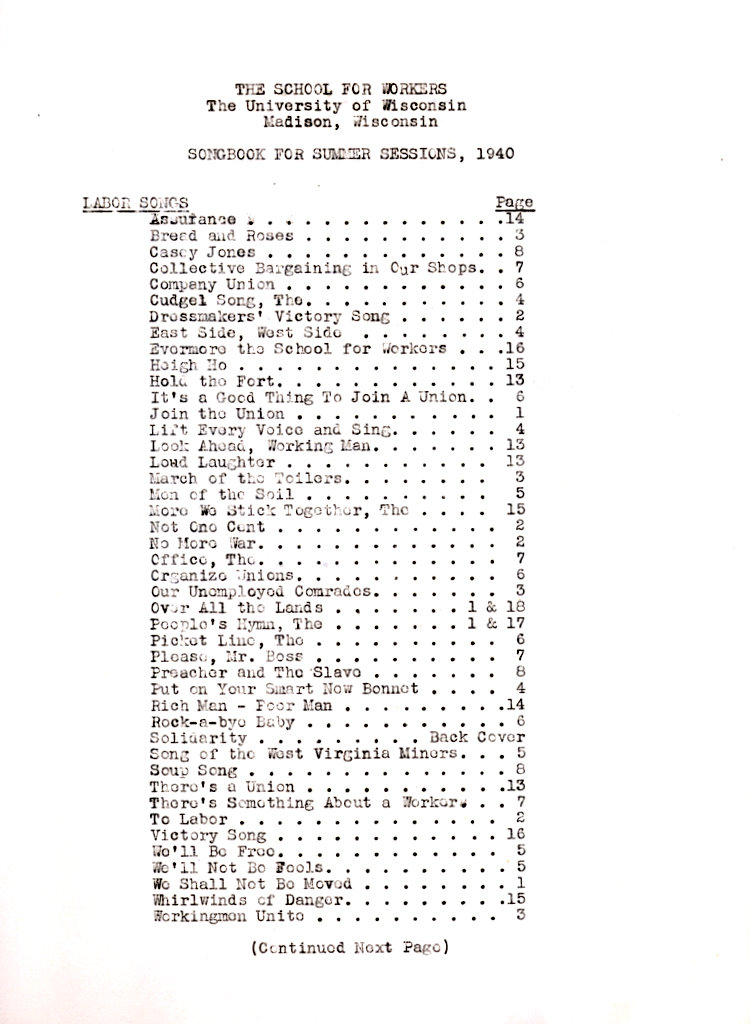
Photo and Folio of the Week: Eddy Arnold on stage, in person, and on screen
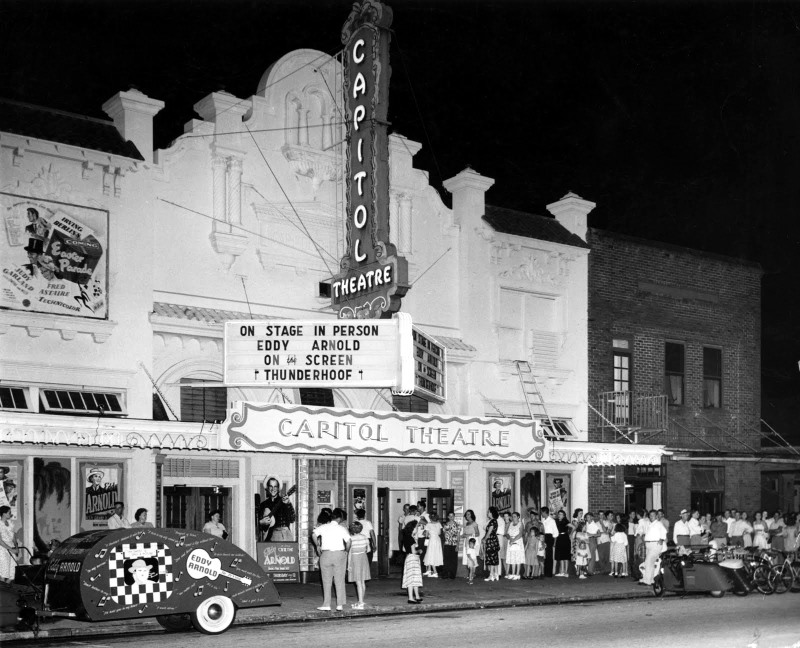 **click image to enlarge**
**click image to enlarge**
This photograph is fascinating as a document of concert goers in the late 1940s, however the band trailer for Eddy Arnold parked out front is what constantly piques my imagination. With the white wall tires and custom paint job, featuring a portrait of Arnold himself as well as the titles of his countless hit songs, I know I’d bee excited to see this barreling down the freeway with Arnold behind the wheel.
We are not sure in which city this photo was taken as there were countless Capitol Theatre’s across the United States, however, we do know Thunderhoof–starring Mary Stuart, Preston Williams, William Bishop, and of course, Thunderhoof as himself–appeared in theaters in 1948 when Eddy Arnold was at the peak of his 1st stage of Country music stardom.
Arnold recorded over 60 top ten hits for RCA throughout the 1940s, under a contract managed by the infamous Colonel Tom Parker. In 1948 he had five songs in the top 10 simultaneously and Arnold held the number 1 spot for 40 weeks of that year. Not sure how much merchandise artists sold on tour back then, but maybe had a few of these song folios, call no. FL-199 from the ever popular Southern Folklife Collection Song Folios, circa 1882-1983 (#30006) , on hand for fans.
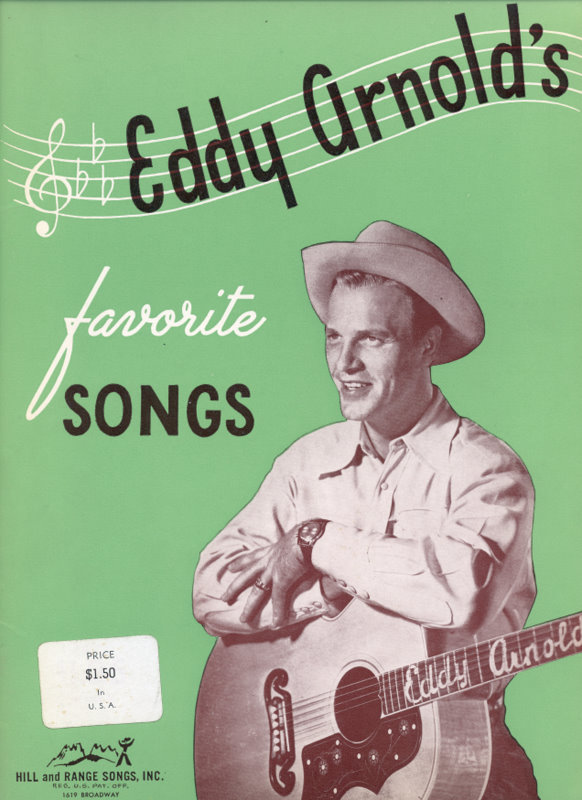
Eddy Arnold’s Favorite Songs. Hill and Range Songs, Inc. New York, N.Y. 1948. 44 p. of music and illustrations.#30006, Series: “Song Folios, circa 1882-1983.” FL-199
“Just a Little Lovin'”
“Anytime”
“Bouquet of Roses”
“Molly Darling”
“Chained to a Memory”
“Detour”
“Drivin’ Nails in My Coffin”
“No Children Allowed”
“Dangerous Ground”
“Rose of the Alamo”
“At Least a Million Tears”
“Can’t Win, Can’t Place, Can’t Show”
“False Alarm”
“Who at My Door Is Standing?”
“He Knows”
Photo of the Week: The DeZurik Sisters
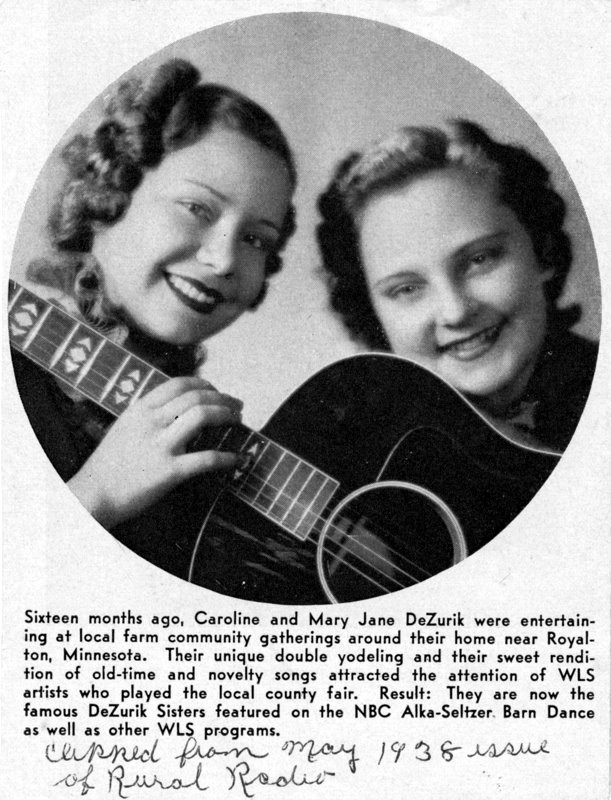 A wonderful 1938 promotional photo of the fantastic yodeling DeZurik Sisters early in their career. Photograph from the John Edwards Memorial Foundation Collection (#20001).
A wonderful 1938 promotional photo of the fantastic yodeling DeZurik Sisters early in their career. Photograph from the John Edwards Memorial Foundation Collection (#20001).
Photo of the week: Porter Wagoner songbook
A young Porter Wagoner, standing in the in the spotlight wearing one of his many stylish “Nudie Suits,” gazes up at himself on the cover of this songbook from his first year on the Grand Ole Opry. Featuring “the songs he loves best,” including the excellent, “Let’s Squiggle,” this 1957 songbook, call no. FL-503, is part of collection #30006: Southern Folklife Collection Song Folios, circa 1882-1983.
Porter Wagoner: Country Music Favorites
Hill and Range Songs, Inc. New York, N.Y. 1957.
41 p. of music and illustrations.
“Eat, Drink, and Be Merry (Tomorrow You’ll Cry)”
“Itchin’ for My Baby”
“Let’s Squiggle”
“I Should Be with You”
“I’m Day Dreamin’ Tonight”
“Tricks of the Trade”
“Love at First Sight”
“Blue Guitar”
“Uncle Pen”
“I Can’t Live with You (I Can’t Live without You)”
“Company’s Comin'”
“I’m Counting on You”
“Be Glad That You Ain’t Me”
“My Everything (You’re My Everything)”
“Trade Mark”
Photo of the week: Sonny James, the Southern Gentleman

Sonny James, best known for his 1957 hit “Young Love,” prepares for a radio broadcast. Photo from the records of the John Edwards Memorial Foundation.
Dr. Demento and John Fahey Interview Son House
 On May 7, 1965, UCLA students Barry Hansen (who, as you know, would later find fame as radio’s Dr. Demento) and John Fahey (already an accomplished guitarist), along with Mark Levine, sat down for an interview with legendary Delta blues singer Son House in Venice, California. House, who had recorded some extremely influential sides for Paramount records in the 1930s before disappearing from the blues scene for almost a quarter of a century, had recently been “rediscovered” and at the time was widely regarded as the greatest Delta blues singer still actively performing (watch him sing “Death Letter” here to see why).
On May 7, 1965, UCLA students Barry Hansen (who, as you know, would later find fame as radio’s Dr. Demento) and John Fahey (already an accomplished guitarist), along with Mark Levine, sat down for an interview with legendary Delta blues singer Son House in Venice, California. House, who had recorded some extremely influential sides for Paramount records in the 1930s before disappearing from the blues scene for almost a quarter of a century, had recently been “rediscovered” and at the time was widely regarded as the greatest Delta blues singer still actively performing (watch him sing “Death Letter” here to see why).
The interview has been preserved on field tape FT-2809 in the SFC’s John Edwards Memorial Foundation Collection. Many of the questions focus on House’s early career in Mississippi and memories of his blues contemporaries. In the clip below House explains the origins of Charley Patton‘s song “Charlie Bradley’s Ten Sixty-Six Blues”:
SonHouse
Dr. Demento On The Old-time Record Review
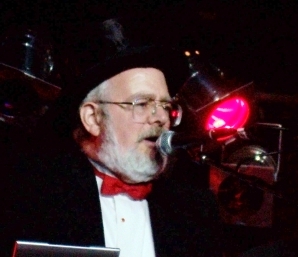
On Friday, February 26th, the Southern Folklife Collection will be hosting legendary broadcaster Barry Hansen, aka “Dr. Demento”, longtime host of the nationally syndicated Dr. Demento Show. He will be presenting a lecture and spinning records on the subject of “Humor in the 20th Century: Country and Blues”. The program begins at 5:45 in Wilson Library’s Pleasants Family Assembly Room, to be preceded by a reception at 5:00, and is free and open to the public.
Mr. Hansen should have much to say on the subject of humor in country and blues music, as before he adopted his Dr. Demento persona to become radio’s greatest spinner of humorous songs he was a young musicology student at UCLA, the original home of the John Edwards Memorial Foundation. In the mid-sixties he began his radio career as the host of the “Old-time Record Review”, a scholarly program devoted to the folk, blues, and country music collected by the JEMF. When the JEMF Collection moved to UNC to become the basis of the Southern Folklife Collection , so too did open-reel tapes of 39 episodes of “Old-time Record Review”.
Listen below to a clip of novice DJ Barry Hansen introducing Hank Williams’ “Mind Your Own Business”, from a 1965 episode of “Old-time Record Review” (SFC# FT-1616):
Hansen

